¡Desconecta con la aplicación Player FM !
140 Catherine Weetman: focusing on fuel AND friction
Manage episode 438710096 series 2592657
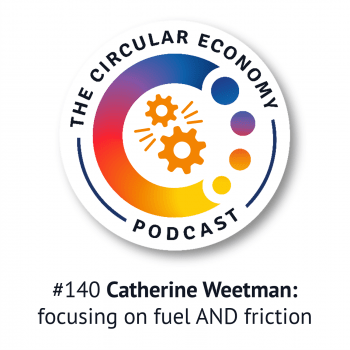
Are we focused on adding more fuel to get the circular economy going – when, really, the problem is too much friction?
Those terms stuck with me a few years ago, from a book helping people to get new ideas going, and succeeding, by looking more closely at the ‘frictions’ that create resistance. The book, The Human Element is written by organisational psychologist Loran Nordgren and David Schonthal, a specialist in entrepreneurship, design, and innovation.
They say that most people working to create change focus on increasing the appeal of the idea itself – we’re convinced that if we add enough value, people will say “yes.”’ Whilst it’s definitely helpful to ‘sell the sizzle’ of our idea, to help move it forward, we tend to overlook the power of all the concerns, confusion, and other factors getting in the way of the change – the friction.
Of course, fuel is necessary for success. Frictions, on the other hand, are difficult to spot. We are naturally convinced that our idea, our project, our new service, is the best thing since sliced bread. So it’s hard for us to see what’s getting in the way for our audience, customers, or investors. Understanding and overcoming frictions requires empathy. We have to see the world, and our idea within it, from the perspective of those affected.
Over the last series of podcast episodes, we’ve talked about quite a few fuels and frictions relating to the circular economy. Reflecting on those conversations helped me see some recurring themes, including:
- Systems thinking, and the need for seeing a connected whole instead of separate parts, or sub-sections
- Culture, language and how we understand and interpret the circular economy
- Mindsets – what’s our worldview, and does this mean we’re stuck in our ways?
- Information technology, especially ‘legacy’ software systems.
In this episode, I’m going to pull out some of the fuel and friction insights shared by our guests.
International speaker, author and strategic advisor, Catherine Weetman helps people discover why circular, regenerative and fair solutions are better for people, planet – and prosperity.
Catherine’s award-winning book: A Circular Economy Handbook: How to Build a More Resilient, Competitive and Sustainable Business includes lots of practical examples and tips on getting started.
Stay in touch for free insights and updates…
Read on for more on our guest and links to the people, organisations and other resources we mention.
Don’t forget, you can subscribe to the podcast series on iTunes, Google Podcasts, PlayerFM, Spotify, TuneIn, or search for “circular economy” in your favourite podcast app. Stay in touch to get free insights and updates, direct to your inbox…
You can also use our interactive, searchable podcast index to find episodes by sector, by region or by circular strategy. Plus, there is now a regular Circular Economy Podcast newsletter, so you get the latest episode show notes and links delivered to your inbox on Sunday morning, each fortnight. The newsletter includes a link to the episode page on our website, with an audio player. You can subscribe by clicking this link to update your preferences.
Links for the episode:
Catherine’s work:
- Circular Economy Podcast on LinkedIn: linkedin.com/showcase/circular-economy-podcast/
- Circular Economy Podcast website: circulareconomypodcast.com
- Catherine Weetman on LinkedIn: https://www.linkedin.com/in/catherine-weetman-9419107/
- A Circular Economy Handbook: How to Build a More Resilient, Competitive and Sustainable Business – buy from any good bookseller, or direct from the publisher Kogan Page, which ships worldwide (free shipping to UK and US) https://www.koganpage.com/CircEcon2
- Interactive podcast index https://www.rethinkglobal.info/circular-economy-podcast-index/
- Rethink Global www.rethinkglobal.info
- Sign up to get the podcast player and shownotes for each new episode emailed to your inbox
Books, films, people and organisations we mentioned
- The Human Element, by Loran Nordgren and David Schonthal https://www.humanelementbook.com/post/our-instincts-about-innovation-and-change-are-working-against-us
- ‘Friction finder’ diagnostic quiz, created by the authors of The Human Element https://kellogg453.outgrow.us/friction_finder-1 (hosted at at the Kellogg School of Management in the US where the authors are Professors)
- Rubén Abruña’s award-winning documentary “Holy Shit: Can Poop Save the World?” streaming options including Vimeo, here: https://holyshit.global/
- Earth4All and Global Commons Alliance have published The Global Commons Survey, conducted by Ipsos UK, which reveals a deep-seated concern among citizens of the world’s largest economies about the current state and future of our planet. https://earth4all.life/news/causing-environmental-damage-should-be-a-criminal-offence-say-72-of-people-in-g20-countries-surveyed/
- Richard Milne, The relentless rise of second-hand, FT Weekend (31/8/2024) [currently NOT behind a paywall] https://www.ft.com/content/9b07bad3-af81-4cd2-a98a-a750fcee9d2e
- Clayton Christensen’s book – The Innovators Dilemma https://claytonchristensen.com/books/the-innovators-dilemma/ – here’s a good overview on Medium https://medium.com/datadriveninvestor/why-do-big-companies-fail-the-tale-of-disruptive-innovation-74ba76cfd70d
- https://www.citytosea.org.uk/the-future-is-returnable-a-circular-approach-to-hot-drinks/
- City to Sea’s ‘blueprint’ for running a successful cups scheme https://www.citytosea.org.uk/the-future-is-returnable-a-circular-approach-to-hot-drinks/
Other podcast episodes we mentioned
- Episode 120 Priorities are changing: people find life is better when we care for and share things – circular economy strategies make that better for business, too https://www.rethinkglobal.info/120-priorities-are-changing/
- 139 Peter McCafferty: supporting circular businesses. Peter McCafferty of Zero Waste Scotland’s Circular Economy Business Support Service discusses the fuel and friction of the circular economy https://www.rethinkglobal.info/139-peter-mccafferty-supporting-circular-businesses/
- 138 Rubén Abruña: keeping our poop in the loop! Award-winning documentary film maker Rubén Abruña highlights regenerative solutions to the massive problems of human sewage. https://www.rethinkglobal.info/138-ruben-abruna-keeping-our-poop-in-the-loop/
- 137 Dr Martin Stuchtey: rethinking how we invest in nature. Geologist, economist & entrepreneur Prof. Dr. Martin Stuchtey is challenging & rethinking industrial, farming & economic systems https://www.rethinkglobal.info/137-dr-martin-stuchtey-rethinking-how-we-invest-in-nature/
- 136 Julia Brenner of Melta: creating value from food waste. Julia Brenner is a soil scientist and co-founder of Melta, a company dedicated to transforming food waste management and soil health https://www.rethinkglobal.info/136-julia-brenner-of-melta-creating-value-from-food-waste/
- 135 Tuomo Laine: unlocking circular business models. Tuomo Laine is CEO & co-founder of Twice Commerce, which provides software to help its clients unlock a range of circular business models https://www.rethinkglobal.info/135-tuomo-laine-unlocking-circular-business-models/
- 134 Jane Martin of City to Sea: powering refill & reuse on-the-go. Jane Martin of City to Sea is preventing plastic pollution by making it easy and affordable for people to reuse and refill on-the-go https://www.rethinkglobal.info/134-jane-martin-of-city-to-sea-powering-refill-and-reuse-on-the-go/
- 133 Re-Action – repurposing: a new life for unwanted stuff. Jen Dickinson and Beccy Evans use creativity and craft skills to breathe new life into unwanted outdoor gear, clothing and workwear https://www.rethinkglobal.info/133-re-action-repurposinga-new-life-for-unwanted-stuff/
- 132 Re-Action – repairing: from radical to renaissance. 3 businesses helping people discover that repairing means caring – Sheffield Clothing Repair, Snowdonia Gear Repair, Vicky Bikes https://www.rethinkglobal.info/132-re-action-repairing-from-radical-to-renaissance/
- 131 Re-Action – Sharing: Serving more people with less stuff. 3 startups providing convenient, affordable access to high-quality outdoor gear: Cirkel Supply, Tentshare & KitUp Adventures https://www.rethinkglobal.info/131-re-action-sharing-serving-more-people-with-less-stuff/
Playlist: getting started with the circular economy…
Want to know more about the what the circular economy really is, and how it can help your business? Here’s a playlist to help you get to grips with the concept, how it creates value, and the common myths (spoiler alert – it’s much more than recycling!)
- #1 What is the circular economy: A quick intro to explain what the circular economy is and why it’s important. We explore how it helps create better products and services, and at the same time helps to make a better world. I break it down into my 5 circular economy components, helping you think about each part of your business.
- #2 The linear economy and your risk checklist: We dig a bit deeper into the way we do business now, the linear economy, and why that’s creating problems for business, society and our living planet. Also, we’ll look at the risks that emerge from those big-picture issues, and how they might affect your organisation.
- #90 Does circular mean it’s sustainable? Catherine Weetman is worried that companies are using circular economy solutions to grow their business (and their footprints).
- #101 Circular is better for people, planet and profit! How three simple strategies can help you get started with circular and regenerative solutions that are better for people, planet and profit.
- #120 Priorities are changing: people find life is better when we care for and share things – circular economy strategies make that better for business, too.
And here’s Catherine’s guide: What is the circular economy?
Want to dig deeper?
Why not buy Catherine’s award-winning book, A Circular Economy Handbook: How to Build a More Resilient, Competitive and Sustainable Business. This comprehensive guide uses a bottom-up, practical approach, and includes hundreds of real examples from around the world, to help you really ‘get’ the circular economy. Even better, you’ll be inspired with ideas to make your own business more competitive, resilient and sustainable.
Please let us know what you think of the podcast – and we’d love it if you could leave us a review on iTunes, or wherever you find your podcasts. Or send us an email…
Please let us know what you think of the podcast – and we’d love it if you could leave us a review on iTunes, or wherever you find your podcasts. Or send us an email…
Podcast music
Thanks to Belinda O’Hooley and Heidi Tidow, otherwise known as the brilliant, inventive and generous folk duo, O’Hooley & Tidow for allowing me to use the instrumentals from the live version of Summat’s Brewin’ as music for the podcast. You can find the whole track (inspired by the Copper Family song “Oh Good Ale”) on their album, also called Summat’s Brewin’. Or, follow them on Twitter.
Previous episodes….
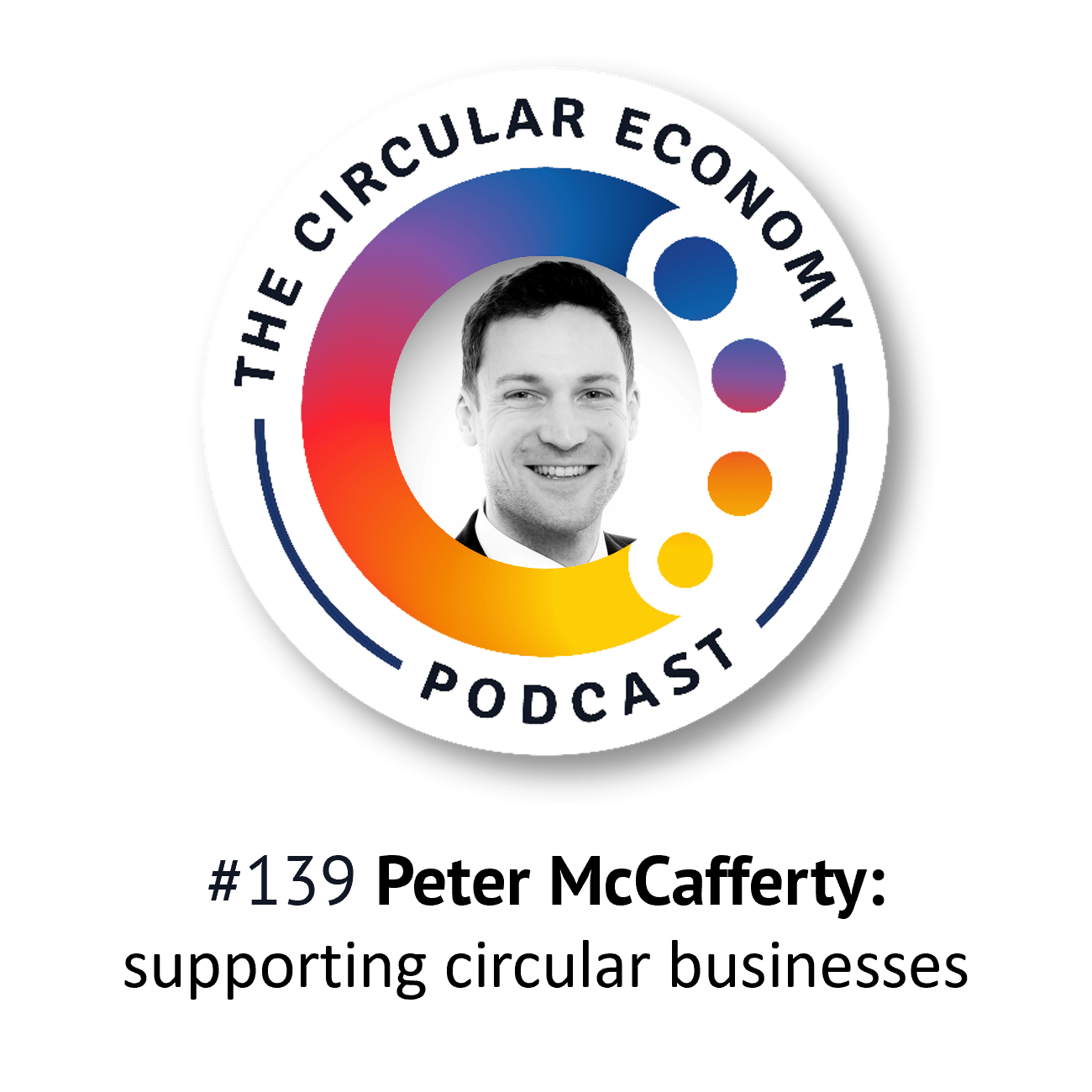
139 Peter McCafferty: supporting circular businesses
25th August 2024
Circular economy
social value
strategy
Peter McCafferty works on Zero Waste Scotland’s Circular Economy Business Support Service (CEBS). These services were launched back in 2017, and since then, Peter has worked with over 200 SMEs and large organisations, so he’s got a wealth of experience and insights to share with us, especially on the fuel and friction around the circular economy. Zero Waste Scotland is…
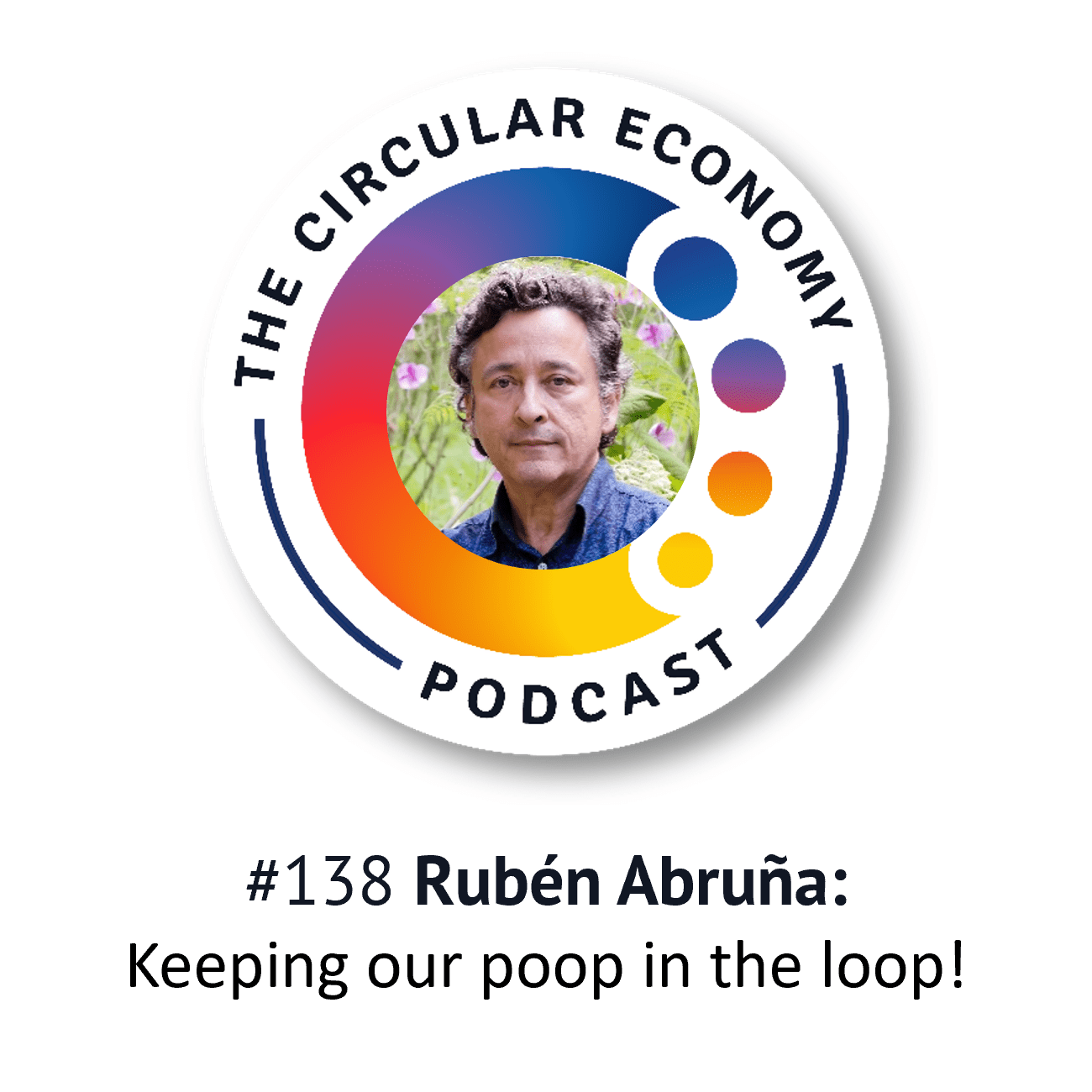
138 Rubén Abruña: keeping our poop in the loop
11th August 2024
agriculture
Circular economy
construction
regenerative
systems thinking
Award-winning documentary film maker Rubén Abruña helps us dig into one of the oldest problems in civil society… All around the world, there are serious problems caused by the various ways we deal with our toilet waste – all the poop and pee we humans create every day. We waste drinking water – Flushing toilets use massive amounts of water…
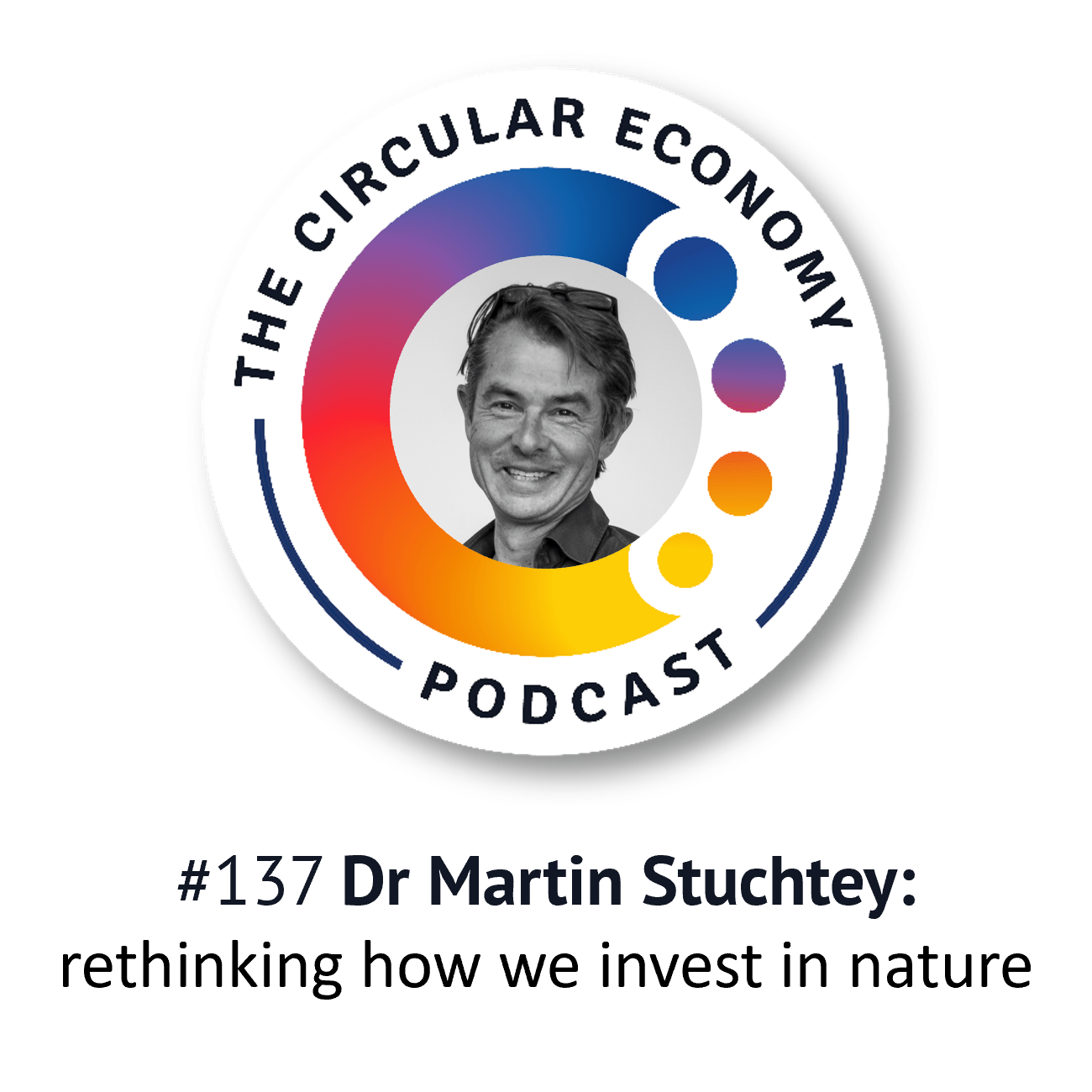
137 Dr Martin Stuchtey: rethinking how we invest in nature
28th July 2024
agriculture
regeneration
systems thinking
Prof. Dr. Martin Stuchtey – a geologist, economist and entrepreneur – is challenging and helping to rethink industrial, farming and economic systems. He founded The Landbanking Group, a Nature Fintech aiming to bring natural capital onto our balance sheets in service of the Paris and Montreal agreements. Dr. Martin Stuchtey is a former Senior and Managing Partner at McKinsey &…
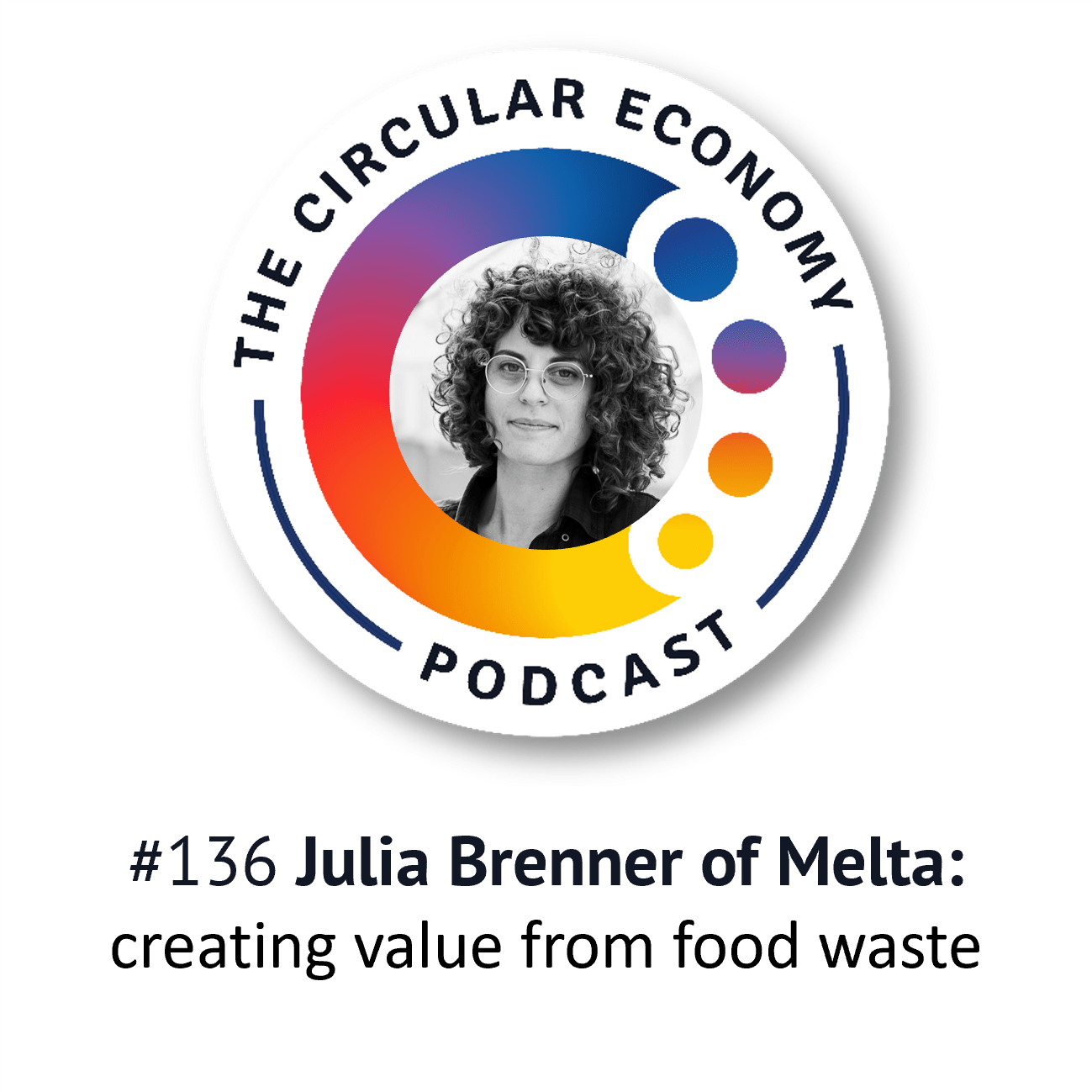
136 Julia Brenner of Melta: creating value from food waste
14th July 2024
Circular economy
food
recycling
regenerative
social value
There is a simple solution to conserve, and reuse, more of the nutrients from food waste. In today’s episode, I’m talking to Julia Brenner, a soil scientist and co-founder of Melta, a company dedicated to transforming waste management and soil health. Julia and her business partner founded Melta in 2020, to solve two interconnected challenges faced by rural municipalities: the…
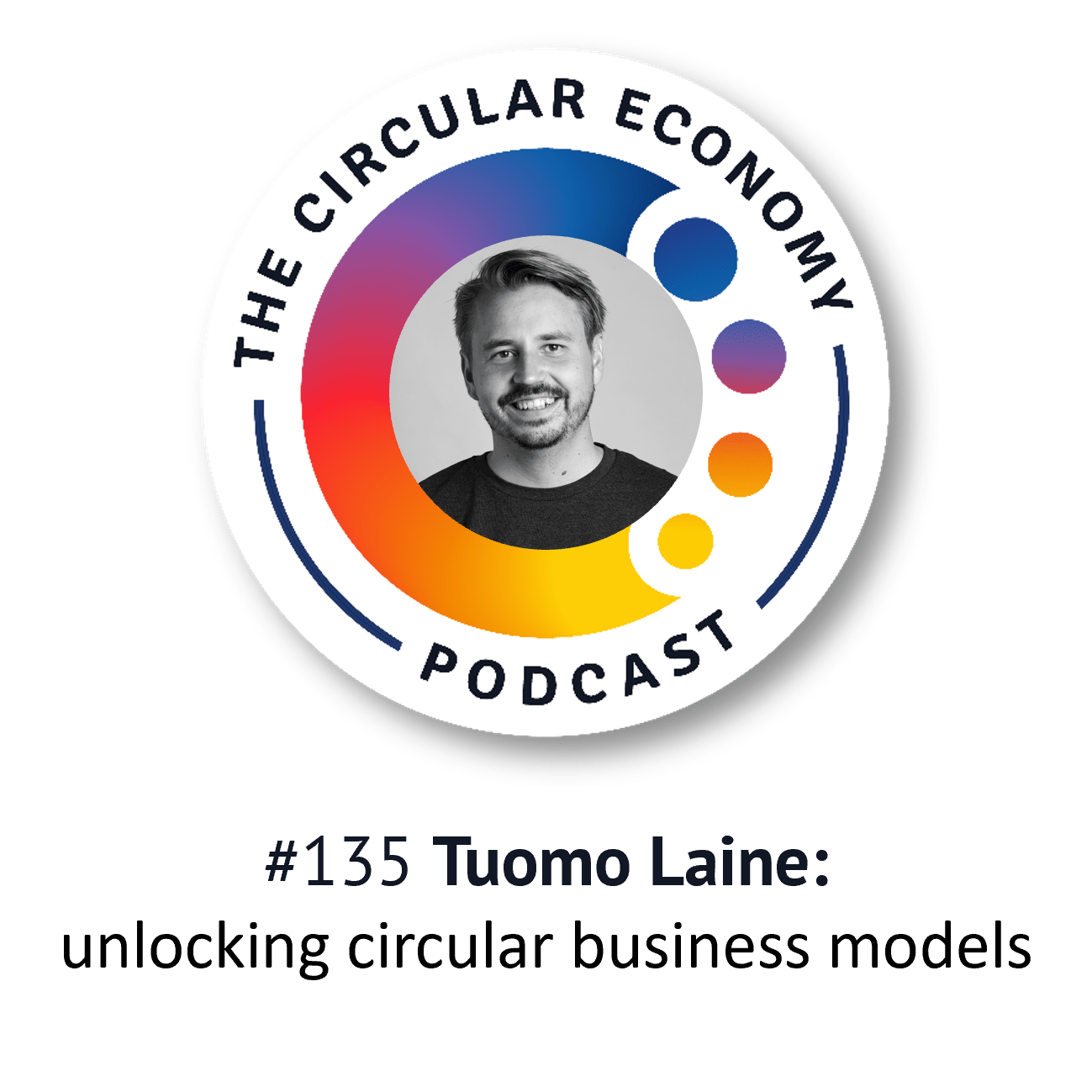
135 Tuomo Laine: unlocking circular business models
30th June 2024
business models
Circular economy
enablers
rental
resell
sharing
software
technology
Tuomo Laine is the CEO and co-founder of Twice Commerce, which provides software to help its clients unlock a range of circular business models. Tuomo is known for being straightforward and action-oriented, and for his dedication to using entrepreneurship for societal good. He is a member of the Unreasonable Group Fellowship, and is occasionally invited to lecture at Aalto University,…
146 episodios
Manage episode 438710096 series 2592657

Are we focused on adding more fuel to get the circular economy going – when, really, the problem is too much friction?
Those terms stuck with me a few years ago, from a book helping people to get new ideas going, and succeeding, by looking more closely at the ‘frictions’ that create resistance. The book, The Human Element is written by organisational psychologist Loran Nordgren and David Schonthal, a specialist in entrepreneurship, design, and innovation.
They say that most people working to create change focus on increasing the appeal of the idea itself – we’re convinced that if we add enough value, people will say “yes.”’ Whilst it’s definitely helpful to ‘sell the sizzle’ of our idea, to help move it forward, we tend to overlook the power of all the concerns, confusion, and other factors getting in the way of the change – the friction.
Of course, fuel is necessary for success. Frictions, on the other hand, are difficult to spot. We are naturally convinced that our idea, our project, our new service, is the best thing since sliced bread. So it’s hard for us to see what’s getting in the way for our audience, customers, or investors. Understanding and overcoming frictions requires empathy. We have to see the world, and our idea within it, from the perspective of those affected.
Over the last series of podcast episodes, we’ve talked about quite a few fuels and frictions relating to the circular economy. Reflecting on those conversations helped me see some recurring themes, including:
- Systems thinking, and the need for seeing a connected whole instead of separate parts, or sub-sections
- Culture, language and how we understand and interpret the circular economy
- Mindsets – what’s our worldview, and does this mean we’re stuck in our ways?
- Information technology, especially ‘legacy’ software systems.
In this episode, I’m going to pull out some of the fuel and friction insights shared by our guests.
International speaker, author and strategic advisor, Catherine Weetman helps people discover why circular, regenerative and fair solutions are better for people, planet – and prosperity.
Catherine’s award-winning book: A Circular Economy Handbook: How to Build a More Resilient, Competitive and Sustainable Business includes lots of practical examples and tips on getting started.
Stay in touch for free insights and updates…
Read on for more on our guest and links to the people, organisations and other resources we mention.
Don’t forget, you can subscribe to the podcast series on iTunes, Google Podcasts, PlayerFM, Spotify, TuneIn, or search for “circular economy” in your favourite podcast app. Stay in touch to get free insights and updates, direct to your inbox…
You can also use our interactive, searchable podcast index to find episodes by sector, by region or by circular strategy. Plus, there is now a regular Circular Economy Podcast newsletter, so you get the latest episode show notes and links delivered to your inbox on Sunday morning, each fortnight. The newsletter includes a link to the episode page on our website, with an audio player. You can subscribe by clicking this link to update your preferences.
Links for the episode:
Catherine’s work:
- Circular Economy Podcast on LinkedIn: linkedin.com/showcase/circular-economy-podcast/
- Circular Economy Podcast website: circulareconomypodcast.com
- Catherine Weetman on LinkedIn: https://www.linkedin.com/in/catherine-weetman-9419107/
- A Circular Economy Handbook: How to Build a More Resilient, Competitive and Sustainable Business – buy from any good bookseller, or direct from the publisher Kogan Page, which ships worldwide (free shipping to UK and US) https://www.koganpage.com/CircEcon2
- Interactive podcast index https://www.rethinkglobal.info/circular-economy-podcast-index/
- Rethink Global www.rethinkglobal.info
- Sign up to get the podcast player and shownotes for each new episode emailed to your inbox
Books, films, people and organisations we mentioned
- The Human Element, by Loran Nordgren and David Schonthal https://www.humanelementbook.com/post/our-instincts-about-innovation-and-change-are-working-against-us
- ‘Friction finder’ diagnostic quiz, created by the authors of The Human Element https://kellogg453.outgrow.us/friction_finder-1 (hosted at at the Kellogg School of Management in the US where the authors are Professors)
- Rubén Abruña’s award-winning documentary “Holy Shit: Can Poop Save the World?” streaming options including Vimeo, here: https://holyshit.global/
- Earth4All and Global Commons Alliance have published The Global Commons Survey, conducted by Ipsos UK, which reveals a deep-seated concern among citizens of the world’s largest economies about the current state and future of our planet. https://earth4all.life/news/causing-environmental-damage-should-be-a-criminal-offence-say-72-of-people-in-g20-countries-surveyed/
- Richard Milne, The relentless rise of second-hand, FT Weekend (31/8/2024) [currently NOT behind a paywall] https://www.ft.com/content/9b07bad3-af81-4cd2-a98a-a750fcee9d2e
- Clayton Christensen’s book – The Innovators Dilemma https://claytonchristensen.com/books/the-innovators-dilemma/ – here’s a good overview on Medium https://medium.com/datadriveninvestor/why-do-big-companies-fail-the-tale-of-disruptive-innovation-74ba76cfd70d
- https://www.citytosea.org.uk/the-future-is-returnable-a-circular-approach-to-hot-drinks/
- City to Sea’s ‘blueprint’ for running a successful cups scheme https://www.citytosea.org.uk/the-future-is-returnable-a-circular-approach-to-hot-drinks/
Other podcast episodes we mentioned
- Episode 120 Priorities are changing: people find life is better when we care for and share things – circular economy strategies make that better for business, too https://www.rethinkglobal.info/120-priorities-are-changing/
- 139 Peter McCafferty: supporting circular businesses. Peter McCafferty of Zero Waste Scotland’s Circular Economy Business Support Service discusses the fuel and friction of the circular economy https://www.rethinkglobal.info/139-peter-mccafferty-supporting-circular-businesses/
- 138 Rubén Abruña: keeping our poop in the loop! Award-winning documentary film maker Rubén Abruña highlights regenerative solutions to the massive problems of human sewage. https://www.rethinkglobal.info/138-ruben-abruna-keeping-our-poop-in-the-loop/
- 137 Dr Martin Stuchtey: rethinking how we invest in nature. Geologist, economist & entrepreneur Prof. Dr. Martin Stuchtey is challenging & rethinking industrial, farming & economic systems https://www.rethinkglobal.info/137-dr-martin-stuchtey-rethinking-how-we-invest-in-nature/
- 136 Julia Brenner of Melta: creating value from food waste. Julia Brenner is a soil scientist and co-founder of Melta, a company dedicated to transforming food waste management and soil health https://www.rethinkglobal.info/136-julia-brenner-of-melta-creating-value-from-food-waste/
- 135 Tuomo Laine: unlocking circular business models. Tuomo Laine is CEO & co-founder of Twice Commerce, which provides software to help its clients unlock a range of circular business models https://www.rethinkglobal.info/135-tuomo-laine-unlocking-circular-business-models/
- 134 Jane Martin of City to Sea: powering refill & reuse on-the-go. Jane Martin of City to Sea is preventing plastic pollution by making it easy and affordable for people to reuse and refill on-the-go https://www.rethinkglobal.info/134-jane-martin-of-city-to-sea-powering-refill-and-reuse-on-the-go/
- 133 Re-Action – repurposing: a new life for unwanted stuff. Jen Dickinson and Beccy Evans use creativity and craft skills to breathe new life into unwanted outdoor gear, clothing and workwear https://www.rethinkglobal.info/133-re-action-repurposinga-new-life-for-unwanted-stuff/
- 132 Re-Action – repairing: from radical to renaissance. 3 businesses helping people discover that repairing means caring – Sheffield Clothing Repair, Snowdonia Gear Repair, Vicky Bikes https://www.rethinkglobal.info/132-re-action-repairing-from-radical-to-renaissance/
- 131 Re-Action – Sharing: Serving more people with less stuff. 3 startups providing convenient, affordable access to high-quality outdoor gear: Cirkel Supply, Tentshare & KitUp Adventures https://www.rethinkglobal.info/131-re-action-sharing-serving-more-people-with-less-stuff/
Playlist: getting started with the circular economy…
Want to know more about the what the circular economy really is, and how it can help your business? Here’s a playlist to help you get to grips with the concept, how it creates value, and the common myths (spoiler alert – it’s much more than recycling!)
- #1 What is the circular economy: A quick intro to explain what the circular economy is and why it’s important. We explore how it helps create better products and services, and at the same time helps to make a better world. I break it down into my 5 circular economy components, helping you think about each part of your business.
- #2 The linear economy and your risk checklist: We dig a bit deeper into the way we do business now, the linear economy, and why that’s creating problems for business, society and our living planet. Also, we’ll look at the risks that emerge from those big-picture issues, and how they might affect your organisation.
- #90 Does circular mean it’s sustainable? Catherine Weetman is worried that companies are using circular economy solutions to grow their business (and their footprints).
- #101 Circular is better for people, planet and profit! How three simple strategies can help you get started with circular and regenerative solutions that are better for people, planet and profit.
- #120 Priorities are changing: people find life is better when we care for and share things – circular economy strategies make that better for business, too.
And here’s Catherine’s guide: What is the circular economy?
Want to dig deeper?
Why not buy Catherine’s award-winning book, A Circular Economy Handbook: How to Build a More Resilient, Competitive and Sustainable Business. This comprehensive guide uses a bottom-up, practical approach, and includes hundreds of real examples from around the world, to help you really ‘get’ the circular economy. Even better, you’ll be inspired with ideas to make your own business more competitive, resilient and sustainable.
Please let us know what you think of the podcast – and we’d love it if you could leave us a review on iTunes, or wherever you find your podcasts. Or send us an email…
Please let us know what you think of the podcast – and we’d love it if you could leave us a review on iTunes, or wherever you find your podcasts. Or send us an email…
Podcast music
Thanks to Belinda O’Hooley and Heidi Tidow, otherwise known as the brilliant, inventive and generous folk duo, O’Hooley & Tidow for allowing me to use the instrumentals from the live version of Summat’s Brewin’ as music for the podcast. You can find the whole track (inspired by the Copper Family song “Oh Good Ale”) on their album, also called Summat’s Brewin’. Or, follow them on Twitter.
Previous episodes….

139 Peter McCafferty: supporting circular businesses
25th August 2024
Circular economy
social value
strategy
Peter McCafferty works on Zero Waste Scotland’s Circular Economy Business Support Service (CEBS). These services were launched back in 2017, and since then, Peter has worked with over 200 SMEs and large organisations, so he’s got a wealth of experience and insights to share with us, especially on the fuel and friction around the circular economy. Zero Waste Scotland is…

138 Rubén Abruña: keeping our poop in the loop
11th August 2024
agriculture
Circular economy
construction
regenerative
systems thinking
Award-winning documentary film maker Rubén Abruña helps us dig into one of the oldest problems in civil society… All around the world, there are serious problems caused by the various ways we deal with our toilet waste – all the poop and pee we humans create every day. We waste drinking water – Flushing toilets use massive amounts of water…

137 Dr Martin Stuchtey: rethinking how we invest in nature
28th July 2024
agriculture
regeneration
systems thinking
Prof. Dr. Martin Stuchtey – a geologist, economist and entrepreneur – is challenging and helping to rethink industrial, farming and economic systems. He founded The Landbanking Group, a Nature Fintech aiming to bring natural capital onto our balance sheets in service of the Paris and Montreal agreements. Dr. Martin Stuchtey is a former Senior and Managing Partner at McKinsey &…

136 Julia Brenner of Melta: creating value from food waste
14th July 2024
Circular economy
food
recycling
regenerative
social value
There is a simple solution to conserve, and reuse, more of the nutrients from food waste. In today’s episode, I’m talking to Julia Brenner, a soil scientist and co-founder of Melta, a company dedicated to transforming waste management and soil health. Julia and her business partner founded Melta in 2020, to solve two interconnected challenges faced by rural municipalities: the…

135 Tuomo Laine: unlocking circular business models
30th June 2024
business models
Circular economy
enablers
rental
resell
sharing
software
technology
Tuomo Laine is the CEO and co-founder of Twice Commerce, which provides software to help its clients unlock a range of circular business models. Tuomo is known for being straightforward and action-oriented, and for his dedication to using entrepreneurship for societal good. He is a member of the Unreasonable Group Fellowship, and is occasionally invited to lecture at Aalto University,…
146 episodios
Todos los episodios
×Bienvenido a Player FM!
Player FM está escaneando la web en busca de podcasts de alta calidad para que los disfrutes en este momento. Es la mejor aplicación de podcast y funciona en Android, iPhone y la web. Regístrate para sincronizar suscripciones a través de dispositivos.




